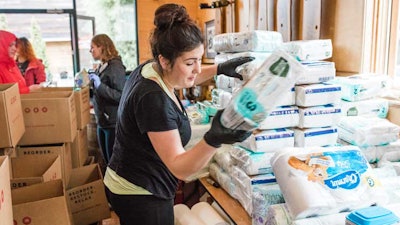
In an attempt to stop the spread of COVID-19, the world slammed the door on the tourism and hospitality industries—and the millions of people who depend on them for their livelihood. The World Travel & Tourism Council estimates that 75 million tourism-related jobs worldwide are at immediate risk.
Yet folks from these hard-hit industries were some of the first to respond with what’s come to be called "caremongering"—as opposed to scaremongering. "Why instill fear in people when we can instill care?" says Greg Klassen, a tourism consultant at Twenty31 and an industry strategist with 25 years of experience.
MANEUVERING MIRACLES
Travel advisers and operators worked around the clock, helping stranded travelers navigate their way home through a new, unpredictable world where borders can snap shut at any moment.
When the Moroccan government issued a travel ban on March 13, two of Access Culinary Trips' American guests were already en route to Morocco. By the time they arrived, the ban had been extended to 25 countries, and by March 15, Morocco had closed its borders entirely.
The CEO of Access Culinary Trips, Tamar Lowell, and her team took quick action, contacting the U.S. State Department, transporting the guests to Marrakech, and arranging a hotel where they could await a flight—though it was unclear when one would be available.
While U.S. repatriation flights didn't take off until March 20 and many travelers weren't informed of them in time to book a seat, Lowell's team was a step ahead, having already spent hours on the phone. They secured the last two seats on a March 19 British Airways flight and provided a two-day supply of food when they delivered their guests to the airport, in case they were delayed further. The guests made it out of Morocco and safely home to San Francisco.
David Harris, the CEO of Ensemble Travel Group, a consortium of North American travel agencies and advisers, says this kind of emergency assistance doesn't generate revenue; most people in the industry are actually losing money due to the spike in cancellations. Yet advisers and operators will often do whatever it takes to ensure their guests are cared for—even when in crisis themselves.
"It's just the nature of the industry," says Jennifer Paterson, managing director of Trans Africa Safaris. "We always want to do well by our visitors."

TAS guests Dean Horvath and Tanya Kemp traveled to South Africa in February to finalize plans for their wedding, scheduled to take place March 28 at Montpelier Wine Estate near Cape Town. Kemp is a South African living in Canada, so some wedding guests started arriving from abroad in mid-March. The global situation began to deteriorate rapidly and as more countries started closing borders and recommending citizens return home—but with still over a week left before their big day—the couple called off the wedding.
On March 19, when Horvath shared this news with the general manager of Lalibela Game Reserve where they were staying, the reserve—along with TAS—proposed they celebrate on-site, and, with the couple’s approval, planned and executed the event in 24 hours. They hired a justice of the peace and a hair and makeup stylist from a nearby town and set up the garden area for the ceremony, laying out a red carpet for the aisle with the game reserve as the backdrop and safari guide Darren Clough standing in as the photographer. Since the wedding rings, gown, and tuxedo were in Cape Town, Kemp's brother scrambled to collect them before hopping on a last-minute flight to reach the reserve.
"The enthusiasm of the staff was truly spectacular," says Horvath. After the ceremony, staff transferred guests to the lodge in safari vehicles and served up a celebratory meal and wedding cake. No one—including the staff—seemed to want the special day to end. The staff cleared the dining area and created a dance floor, insisting there was no closing time.
"Everyone knew the realities of the world were going to set in the next day," Horvath says, so they embraced the magical experience they'd created together, with the last guests finally heading to bed at 5 a.m. The couple returned safely to Canada on the first available flight March 23, and the last wedding guest left South Africa on March 24—two days before the country went into lockdown.
"There would have been no chance to get my family from Canada and Tanya's family from South Africa together in one place again," says Horvath. "We'll be forever grateful to Lalibela and TAS for putting together such an amazing experience."

TAKING CARE OF COMMUNITY
Look around and you'll find endless examples of travel and hospitality folks countering COVID-19 hardships with compassion.
The Recess Room, a restaurant in Fountain Valley, California—10 minutes from Huntington Beach's world-class surf breaks—was forced to lay off 90% of its staff. The trickle of takeout is less than 2% of usual revenue yet they're providing "Free Food Friday" meals for students, seniors, and others in need, and 50% off for health care workers, first responders, and hospitality workers.
"People might think we're crazy giving away food and discounts when our business is rapidly dying," co-owner Viet Pham says. "But for us, it's more important to spend this time fighting this battle as a community."

When the Bentwood Inn in Jackson Hole, Wyoming was forced to close at the peak of spring ski season, managers called up a local senior center.
"We learned they needed to start delivering breakfast for Meals on Wheels clients who were afraid to go out," says owner Keith Sproule. "We are experts at delivering specialty baked goods to our guests; now we are doing it for our elderly neighbors."
The property is also donating funds from its May 7 dinner to the Bwindi Community in Africa through the international nonprofit AKP.
Despite being forced to lay off some of her staff, Julie Pullen, general manager at Accent Inns hotel in Kamloops, British Columbia, immediately helped find them employment in eldercare facilities. And when the general manager at Accent Inns Victoria heard nurses were sleeping in cars between shifts to avoid bringing risk to their families, she alerted president and CEO Mandy Farmer, who helped devise a chain-wide discounted rate for "essential service employees." The rate is just enough to cover the hotels' costs, including wages associated with maintaining the rooms; Accent Inns is forgoing profit in order to serve those in need.
Realizing millions of restaurant workers would be immediately out of work, Chef Edward Lee of Louisville and his team established the Restaurant Workers Relief Program.
"A lot of people live week-to-week," Lee says. "They're the backbone of the industry and they need help right now." With seed funding from Maker's Mark, the program has turned 21 restaurants (and counting)—including two of Lee's—into relief kitchens, handing out more than 100,000 meals to date.
THE INDUSTRY IS FAMILY
Generosity in the face of adversity is a thread woven deep into the fabric of the tourism and hospitality industries. Or, as Klassen suggests, it "runs through their veins."
Houston Moncure, managing director of Bluefields Bay Villas in Jamaica, says, "This is a business, but it's also family.” In hospitality and travel, sometimes that means your actual relatives—Houston's parents bought their first Bluefields property in 1982 — and often includes your community, like Percy, the driver that took Houston's mother to the hospital to give birth to him 35 years ago and still works with them today.
To continue providing meals, income, and supplies to the team during the pandemic, the Moncures aren't taking salaries themselves. They're also arranging rides to and from the property, offering sanitation supplies for the staff to take home as needed, and a stipend to elderly staff so they can stay home and avoid risk. Moncure says zero revenue and the uncertainty—of the duration and of the post-pandemic economy—is daunting, but he and his family are going to do what they can "in any way possible to help everyone get through this."
The Shenton family of Zambia is also forgoing salaries in order to ensure their Shenton Safaris staff—their "extended safari family"—has an income, food, and supplies. "Each team member is the sole breadwinner for their respective families and supports up to (if not more than) 10 relatives," says team member Agata Passoni.
Local wildlife also relies on Shenton Safaris. "Every year, Shenton Safaris opens up a network of roads in the northern sector of the South Luangwa National Park, at our own cost, to give anti-poaching patrol units and rapid action response teams access to defend these territories from poachers," Passoni says. In the absence of tourism revenue, the Shentons are prepared to commit personal funds to continue critical wildlife conservation efforts.
Others in the industry, like Cottar's Safari Services and Green Safaris, are lending a (highly sanitized) hand to the communities where they operate—in the form of vital COVID-19 information dissemination to vulnerable populations, construction of handwashing stations, and donation of medical supplies.
The caremongering has caught on.
Travelers and event planners are postponing rather than canceling trips, and people are buying gift certificates for future meals at their favorite restaurants, injecting them with funds now, when they need it most.
Cottar's former and future guests are donating to their Wildlife Conservation Trust to support community and conservation efforts.
Loyal guests of Bluefields Bay Villas have offered monetary tips to staff that they would have given in person, had their visit not been postponed by the pandemic.
Donations have been pouring into Restaurant Workers Relief Program kitchens—in just three days, they raised over $25,000 in Louisville alone. And when Victoria resident Pamela Lewis contacted Accent Inns, offering to pay for health care or essential workers' stays, others in the community followed suit.
Like viruses and fear, kindness is also contagious. And it's something we can all supply. "Be nice to your neighbors and your community," Lee says. "There are people who are suffering, and we're all in this together."



















